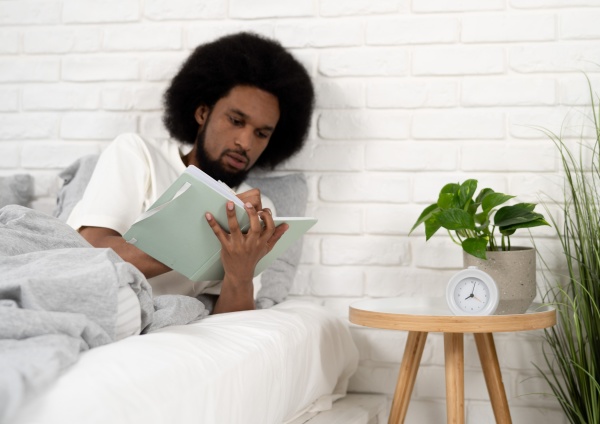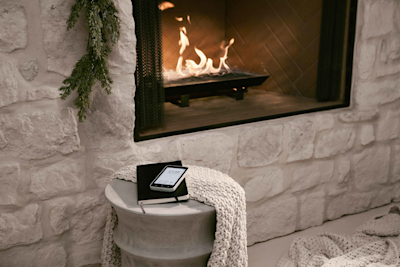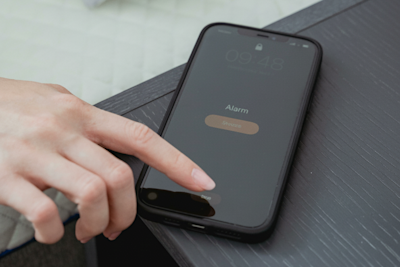
How to Create an OFFLINE Bedtime Routine
The Importance of a Bedtime Routine
As children, most of our parents imposed bedtime routines on us, in order to ensure we went to bed on time. However, at a certain age, the enforcement of the bedtime routine became less and less consistent, until eventually, it wasn't a significant part of our day. As adults, many of us go to bed at irregular hours and often wake up feeling tired and groggy. For those suffering from various sleep issues, going to bed can sometimes become a frustrating and stressful experience.
Numerous studies suggest that reintroducing a bedtime routine as an adult may have a positive impact on our sleep quality in addition to many other health benefits. [1]
This is why the importance of a bedtime routine must not be overlooked.
Wind down
Your body needs time to prepare in order to get ready for sleep. Consider creating a wind-down period approximately thirty minutes to an hour leading up to your bedtime. Try a calming activity such as listening to soothing music or ambient sounds, meditating or journaling when getting ready to go to bed. You can also listen to meditative readings, reflections, or sleep podcasts to help you relax and unwind. Think of them as the contemporary version of a bedtime story.
Mudita Harmony 2 Relaxation Library
Put away the screens
Another thing to consider when getting ready for bed is the use of screens. Although electronic devices and media use has become a part of many modern-day nightly rituals, blue light emitted from electronic screens interferes with our natural sleep cycles. Limiting our exposure to blue light is an important way to help your body naturally prepare for sleep. If you use your smartphone as an alarm clock, consider switching to a traditional alarm clock, such as Mudita Bell or Mudita Harmony. The temptation to mindlessly scroll through your phone will be lessened if your device is not within reach, right on your night stand.
Mudita Harmony & Mudita Bell
Create darkness
Darkness is essential to sleep. Light can affect your circadian rhythms because bright light suppresses the production of melatonin. When our sleeping environment is dark, it sends a signal to our brain that it’s time to start getting ready to fall asleep. If you cannot block all light from entering your room, or perhaps you prefer not to, try wearing a sleep mask to create the illusion of darkness for your brain. Studies suggest that light penetrating through the eyelids can also inhibit melatonin production. [2]
Consistency is key
We all know that as with any good habit, consistency is also key when it comes to sleep. Try to go to bed and wake up at a similar time everyday, even on the weekends. The consistency in sleep schedule maintains the timing of the body's internal clock and can help you fall asleep and wake up more easily
Making sure you get to bed around the same time every night is easier with a consistent bedtime routine. As humans, we are definitely creatures of habit. Routines help our brains recognize when it’s time for specific activities. Staying consistent with your bedtime routine helps regulate the internal clock, otherwise known as our circadian rhythm, helping you to fall asleep faster and wake up easier.
Listen your way to better sleep
Listening to relaxation music before you go to bed can greatly improve your sleep quality, allowing you to enjoy a good night's sleep and wake up feeling better than ever. Not only does it have a positive effect on the psyche by promoting a more relaxed emotional state due to its anti-stress effect, it also improves physical health by lowering blood pressure and slowing down your breathing and heart rate.
Rain, the sound of the river, the storm, the breaking waves - these are just some of the natural sounds recorded to help you fall asleep. Some of them are accompanied by soothing music, such as soft piano notes, while others come in pure form to gently lull you into the deepest sleep.
Our Mudita Harmony mindful alarm clocks feature a Relaxation Library which not only contains soothing nature and ambient sounds, but also allows you to upload your own custom audio via Mudita Center, for a more personalized relaxation experience. You can listen to a podcast, your favorite audiobook, or a relaxing song. It's all up to you with Mudita Harmony and Mudita Center.
Discover the ultimate companion for your Mudita Harmony—all from your desktop!
If you’d like to read more about topics connected to the subject of better sleep, please take a look at our Sleep Better page for more information and helpful resources.
Read also:
Healthy Sleeping Tips: A Simple Guide to Better Sleep
10 Bedroom Plants to Help You Sleep Better
Nap like a PRO: The Secret of the POWER NAP
Join the conversation
Our forum is a great place to share ideas and discuss topics connected to wellness and well-being.
Related stories

Starting the New Year with Fewer Distractions, Not More Tech
A gentle January reset. Start the new year with fewer distractions and learn how mindful tech use can support focus, rest, and more meaningful downtime.

Introducing Mudita Mindful Design
Mudita Mindful Design is our in-house framework for building clear, intentional E Ink interfaces. Learn our design principles for calm and mindful technology.

Why Smartphone Alarms May Be Ruining Your Sleep
Find out why smartphone alarms may harm your sleep and explore healthier alternatives like mindful alarm clocks, sunrise lights, and gentle sounds.
Jeśli chcesz otrzymywać najlepsze historie z naszego bloga, bądź na bieżąco z naszymi postępami i otrzymuj powiadomienia o premierach naszych produktów i specjalnych zniżkach.